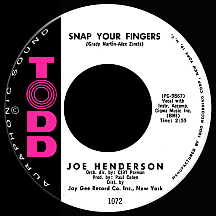JOE HENDERSON
Snap Your Fingers
There were three diverse music men, all of them named Joe Henderson, whose careers overlapped during the 1960s. The oldest and first to gain popularity was a Scottish-born pianist who began recording in the mid-'50s using the nickname "Mr. Piano." His best-known tune is "Trudie," a breezy instrumental hit in Great Britain in the summer of 1958; in the U.S. he appeared on the Cub and Signature labels and by the late '60s he was billed as "Fantastic" Joe Henderson on Fontana. A different Joe Henderson made a name for himself in jazz circles as a skilled tenor saxophonist starting in the mid- to late-'50s. He racked up a long and highly-regarded catalog of recordings on Blue Note, Verve and other labels for the better part of four decades in addition to concert and session work with dozens of jazz greats. Then a singer arrived on the scene with a deep bass voice and a style that straddled pop, rhythm and blues and country. This Joe Henderson developed quickly with a career-defining hit song (or two), then abruptly left our world just two years later. While there has been a good deal of confusion between these three over the years, it wasn't a particular problem at the time, as each appealed to a completely different audience.
Joseph Henderson the singer began life in Como, Mississippi (a small town about 50 miles south of Memphis, Tennessee) and was raised in Gary, Indiana, where as a teenager he cut his teeth singing bass with a church quartet. Moving to Nashville in 1958, he sought a career in gospel and spent a couple of years with The Fairfield Four. The group had formed in the early 1920s and finally made their first 78 RPM discs for the Bullet label in 1946; later members Roscoe Shelton and Bobby Hebb went on to achieve success in the secular field. Henderson was a member in 1960 and is featured on The Bells Are Tolling; recorded in Nashville, it sat on the shelf two years before release on the Old Town label. His booming bass lead is evident on some tracks ("Every Knee Has Got to Bow," "In the Old Time Way") and, though largely overlooked at the time, Bells was later recognized as one of the best gospel albums of the era.
Paul Cohen, a country music producer with three decades' experience, started his own Nashville record label, Todd, in 1958. Henderson, who'd shortened his first name to Joe, came on board in 1961 and with Robert Riley (best known as cowriter of "Just Walking in the Rain," a huge hit for Johnnie Ray) he composed "Baby Don't Leave Me," a quietly effective track that reached the R&B top ten in February '62. Joe's vocal similarity to major star Brook Benton wasn't entirely obvious at first (he sang in a lower register than Brook), but with the second single, "Snap Your Fingers" (penned by Alex Zanetis and Nashville songwriter/session guitarist Grady Martin), he managed to fool a majority of radio listeners into thinking they were hearing a new Benton single. A top ten pop hit and number two R&B smash that summer, the brass-heavy arrangement complemented Joe's robust reading of the lyrics (...turn the key and let me in...through that same old door!'), becoming the money-making hit that had eluded Cohen's company during its nearly four years of existence.
A few months later Benton released "Hotel Happiness," which had a melody and arrangement suspiciously similar to Henderson's top seller. In early 1963 it, too, went top ten, a curious case of a major act imitating a newcomer, whether or not it was on purpose. Detroit-based singer Barbara Lewis, a breakthrough star in her own right that year with "Hello Stranger," offered her own take on "Snap Your Fingers" and it slipped onto the national survey near the end of '63. Henderson followed his one-two punch with a pair of lower-rung chart singles: Louis Innis's "Big Love," sonically similar to the previous smash, and the gospel-tinged "The Searching is Over," written by Joe with Don Schroeder (the "Papa Don" behind later hits by James and Bobby Purify, Oscar Toney, Jr. and Carl Carlton). Cohen gave Joe a nickname, "Mr. Voice," and had it printed in red above his name on his ninth and final Todd single, "You Take One Step (I'll Take Two)," which charted briefly in the spring of 1964.
Shortly afterwards Paul Cohen closed the doors at Todd Records and returned to the steady income of a big label position; later in the decade he worked in the country divisions of Kapp and ABC. Joe wasted no time finding another Nashville label, laying down 12 sides for RIC (Recording Industries Corporation). But a short time later he unexpectedly died of a heart attack in the Nashville apartment he shared with Arthur Alexander, who discovered his body in late October 1964 after returning from a scheduled weekend performance. Henderson was just 26 years old. RIC released three posthumous singles starting with "River or the Railroad Track," but the soulful sides were unsuccessful. These days Joe is little more than a footnote in music history, though "Snap Your Fingers" and his other recordings are worthwhile for fans of the era willing to seek them out. Professionally speaking, the name Joe Henderson is about as common as they come; many such notable Joes can be found in sports, film, comedy and other professions...and, like the three aforementioned musical Hendersons, most of them were born with the name.


